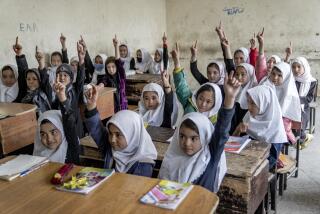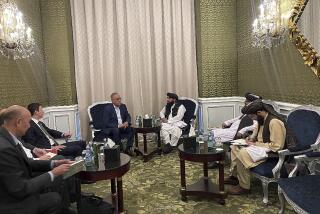Afghan Women Fear Losing Rights Under Taliban Rule
- Share via
ISLAMABAD, Pakistan — Even if peace returns to war-weary Afghanistan, Gulalai Habib fears she may never return home--for her daughter’s sake.
One of Afghanistan’s strongest factions, the Taliban, is clamping down on women’s rights and opportunities. What is worse, Habib and other Afghan women say, is that the United Nations is not prepared to stop them.
U.N. officials don’t dispute that.
“If I even mentioned women to the Taliban, they would stop talking to me,” said U.N. envoy Mahmood Mestiri, a former Tunisian foreign minister who is trying to work out a peace accord in Afghanistan’s civil war. “I’ll never do it.”
Most Taliban militiamen are former religious students, and the group’s governing council in the southern Afghan city of Kandahar is made up of hard-line Islamic scholars.
The group has seized control of about half of Afghanistan, and diplomats and aid workers say a veil of isolation and discrimination is rapidly descending on women in Taliban territory.
Taliban fighters keep girls from attending school, tell women to stop working, force women to cover themselves from head to toe, and threaten them with harsh punishment if they leave their homes unaccompanied by a man. They have even forbidden foreign women to drive cars.
Worries about the future under the Taliban are particularly strong among urban Afghan women, who have a tradition of working outside the home and of girls attending school.
Mestiri’s refusal to confront Taliban leaders over the issue infuriates those women. They contend that he, in effect, endorses Taliban actions by not opposing them.
“Who are we that we are not worth the risk? What is the U.N. if it can ignore women?” asks Habib, who fled Kabul, the Afghan capital, in 1992 after Muslim insurgents overthrew a Marxist regime and then turned their guns on each other.
Mestiri says that ending the war in Afghanistan is a complicated business and bringing women into the peace equation would only further confuse the issue.
*
But peace without women’s rights is peace only for men, Habib says.
“We need the U.N. to say to them that unless they give women their rights, all aid will stop,” she says. “They are our only hope. But Mestiri just wants to say, ‘I have an agreement.’ He doesn’t care what becomes of women.”
The same fears are voiced in Kabul, which is besieged by Taliban gunmen who daily lob rockets into the city.
“It should be that the United Nations gives opportunities for women to participate in the peace plan,” says Mariam Aza, a student at Kabul University. “If the United Nations doesn’t include women, that means the United Nations is against women in Afghanistan, against human rights.”
Kubrah Dasthgezah, a research assistant in the capital, says: “Women should have opportunities to study. This is under Islamic law. It’s human rights for women to study and work.”
Trained as a civil engineer in Afghanistan, Habib fears that her 7-year-old daughter, Halal, may never have the opportunities that she enjoyed. She hopes that Halal will go to school, become self-confident and learn that she is equal to any man. But that dream may be out of reach in an Afghanistan run by the Taliban.
Taliban leaders openly admit that they consider women inferior.
“Women just aren’t as smart as men. They don’t have the intelligence,” says Noor Mohammed, a senior member of the Taliban central committee. “We categorically refuse to let women vote or participate in politics.”
*
Keeping women in seclusion, denying them education except for instruction in the Koran, the Muslim holy book, is in keeping with the tenets of Islam, Taliban leaders say.
“That’s not Islam,” counters Habib. “Islam demands--it doesn’t suggest--it demands that women be educated, that women be respected and be treated fairly.”
Mestiri is pushing a peace plan for Afghanistan that calls for a 28-member governing council with representatives from the numerous rival factions.
Asked in December whether his proposal would include women, Mestiri laughed. “Women, never. I haven’t mentioned women to the Taliban and I am not going to,” he says.
He defended his comments later during an interview with Associated Press.
“The U.N. cannot be expected to do everything right away . . . bring human rights to a country like Afghanistan,” he says.
Within days of capturing the western city of Herat, Taliban leaders shut all girls’ schools, sent 30,000 young girls home and fired 3,000 female teachers.
“Some women are working, but it’s clandestinely,” says Angela Kearney, program manager in Herat for the privately run Save the Children relief agency.
In the frontier city of Peshawar in neighboring Pakistan, Fatana Gailani runs a clinic for Afghan women. Gailani says she fled her homeland in 1979 when Soviet troops moved in and that she helped the Islamic rebel groups who fought the Communist regime for 14 years.
“When we see that the U.N. is not caring for women in Afghanistan, we feel very much shame,” she says in broken English.
In New York, Gregoire De Brancovan, U.N. humanitarian affairs officer for Afghanistan, says the approach to women’s rights varies among Islamic countries, but he admitted that “we’re facing some problems in our offices there.”
Late last year in the eastern city of Jalalabad, U.N. administrators sent their female workers home at the request of a local religious council.
It shouldn’t have happened, a senior U.N. official in Islamabad says. “No one can tell us who we can employ . . . we are not going to tell women not to work in our offices,” says David Lockwood, the United Nations Development Program resident representative for Afghanistan.
More to Read
Sign up for Essential California
The most important California stories and recommendations in your inbox every morning.
You may occasionally receive promotional content from the Los Angeles Times.










